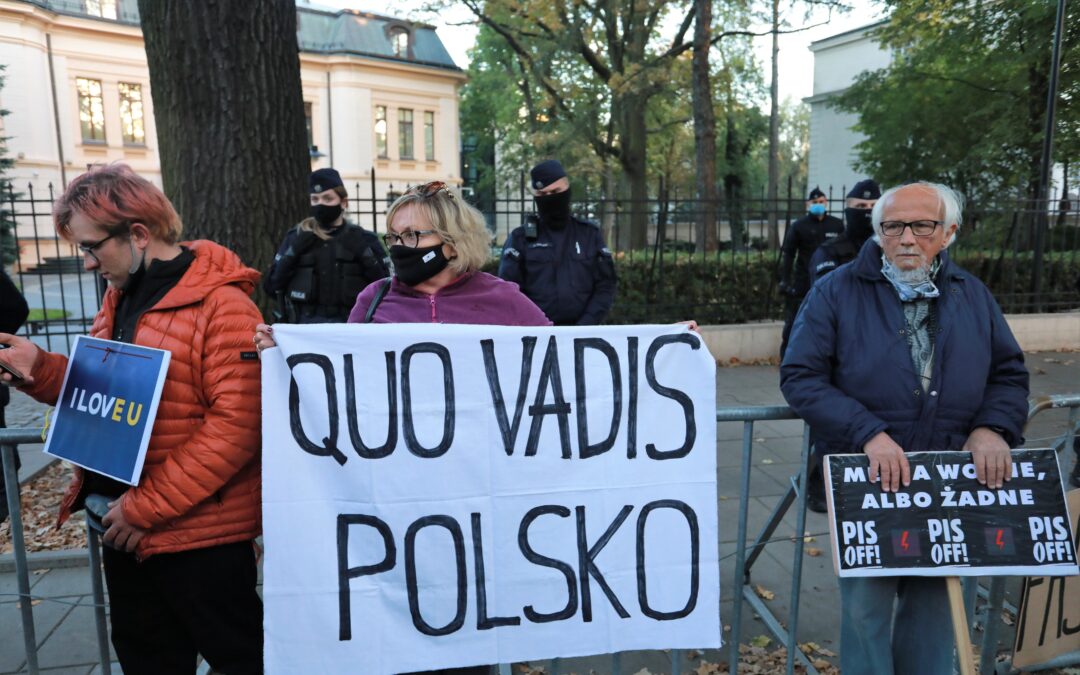Democracy has declined in Poland for the eighth consecutive year and reached its lowest recorded level, according to the latest annual ranking published by Freedom House.
In its Nations in Transit report, the US-based NGO raises particular concern over the Polish “government’s instrumentalisation of the politically captured Constitutional Tribunal (TK) to attack European Union treaties, the European Convention on Human Rights (ECHR), and reproductive rights“.
Since 2020, Freedom House has no longer classified Poland as a full democracy. Last year, it revealed that Poland has recorded the fastest decline in democracy across the 29 countries in Central and Eastern Europe and Central Asia that it monitors for Nations in Transit.
Poland has seen region's fastest democratic decline, finds Freedom House https://t.co/DXl6KOtMqL pic.twitter.com/2Q1SMRo7Px
— Martin D. Brown (@MDRBrown) April 28, 2021
In this year’s report, Poland’s democracy rating fell again, due to a drop in its score for the “national democratic governance” category. This was because the government has “changed the system to its advantage, capturing and instrumentalising key institutions such as the Constitutional Tribunal”.
The government has stacked the TK with its own appointees, in some cases illegitimately, according to a ruling by the European Court of Human Rights (ECtHR), which last year found that the TK in its current form is not a “tribunal established by law”.
The TK itself has hit back, issuing two rulings last year that declared parts of the ECHR to be incompatible with Poland’s constitution. It also ruled that the constitution has supremacy over EU law and that a European Court of Justice (ECJ) order could effectively be ignored by the government.
Freedom House also notes that Poland has been refusing to pay millions of euros in fines issued against it by the ECJ last year for failing to comply with orders to suspend operations at a coal mine and to shut down a disciplinary chamber for judges.
The European Commission recently began to take the unpaid fines from Poland’s EU funds – the first time such an action had ever been taken against a member state.
The new report also notes that last year continued to see fines for breaching Covid protocols overturned by Polish courts due to a lack of proper legal basis for restrictions introduced by the government.
Meanwhile, a migration crisis at the border with Belarus, though “orchestrated by…Belarus’s authoritarian leader, Alexander Lukashenko”, resulted in Poland banning media and humanitarian groups from the border and facing criticism for pushing back migrants and preventing asylum applications, notes Freedom House.
The NGO also pointed to the fact that independent media face “baseless or exaggerated lawsuits” and that the government sought to end US ownership of the country’s largest private TV station – a move that was only blocked by a presidential veto.
Moreover, “elections are free but not fair due to the state broadcaster’s bias and the use of public funds as election financing for the governing majority’s candidates”, says the report.
Poland has also recently slumped in a number of other similar rankings of freedom and democracy. In the Human Freedom Index, published by libertarian think tank the Cato Institute, Poland now ranks 49th overall worldwide – behind Albania and Mongolia – slipping from a high of 21st in 2011.
Varieties of Democracy (V-Dem), which produces the largest global dataset on democracy, last year found that Poland has moved further towards autocracy than any other country in the world over the last decade.
Similarly, the World Justice Project, a Washington-based think tank, found in October that Poland had seen the largest decline in rule of law over the last year. The country’s drop was driven in particular by lower scores for constraints on government powers and fundamental rights
Poland’s government has argued that the country’s declining position in most rankings of democracy – as well as regular criticism from international institutions – result from outsiders failing to properly understand the situation, being misled by the Polish opposition, or simply being biased.
The ruling Law and Justice (PiS) party argues that it has actually improved Polish democracy by rebalancing a media landscape that was previously dominated by liberal-leaning outlets and by removing “post-communists” from the judiciary. However, critics note that PiS itself has appointed former communists to the courts.
PiS also notes that it was elected to power in 2015 with an unprecedented majority, and then given a second term by voters in 2019. Its candidate for president, Andrzej Duda, was likewise re-elected for a second term in 2020. During that period PiS has also won local and European elections.
Main image credit: Jacek Marczewski / Agencja Wyborcza.pl

Daniel Tilles is editor-in-chief of Notes from Poland. He has written on Polish affairs for a wide range of publications, including Foreign Policy, POLITICO Europe, EUobserver and Dziennik Gazeta Prawna.




















